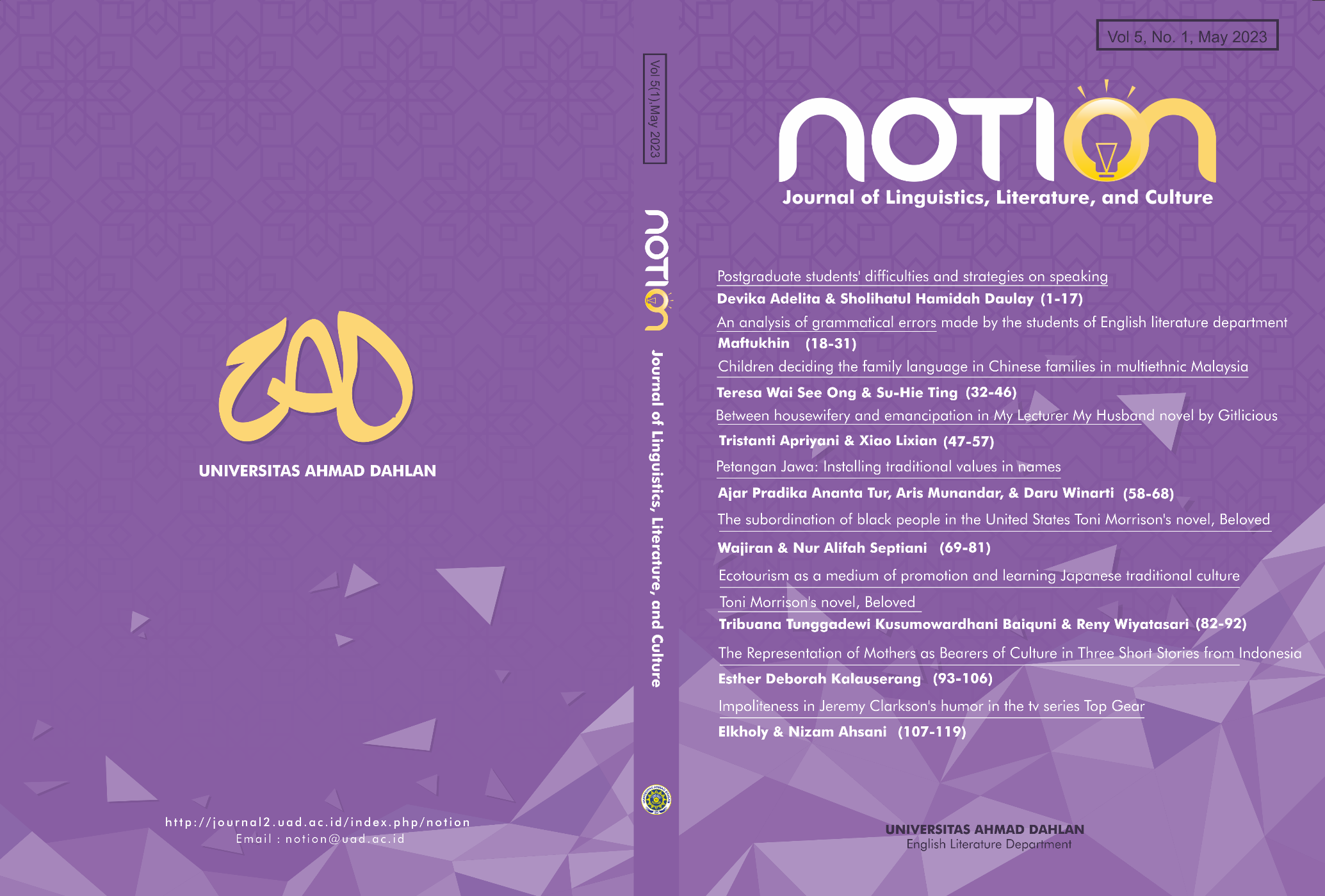Ecotourism as a medium of promotion and learning Japanese traditional culture
DOI:
https://doi.org/10.12928/notion.v5i1.6773Keywords:
japanese, traditional culture, ecotourism, promotion, learningAbstract
After going through the pandemic for approximately two years, the enthusiasm of foreign tourists to come to Japan would still high. This proves that tourism is the leading sector of foreign exchange for Japan. Apart from being a foreign exchange, Japan can also promote the uniqueness of their country, including Japanese traditional culture. Japan promotes its traditional culture through one of the concepts of sustainable tourism, which is ecotourism. Ecotourism is not just an activity that prioritizes nature as an attraction but also aims to preserve the environment and improve the cultural welfare of the local community. This study explains the role of ecotourism as a medium for promoting and learning Japanese traditional culture. The method used in this study is a qualitative descriptive method. The results of this study indicate that Japan can promote ecotourism and its traditional culture with collaborations between the stakeholders. Furthermore, tourists can learn about Japanese traditional culture through various activities offered by ecotourism destinations.
References
Buckley, R. C. (2012). Sustainable tourism: research and reality. Annals of Tourism Research, Vol. 39(2), p. 528-546. https://doi.org/10.1016/j.annals.2012.02.003
Damanik, J. and Weber, H. F. (2006). Perencanaan ekowisata: Dari teori ke aplikasi. Yogyakarta: Andi Offset.
Fukamachi, K. (2016). Sustainability of terraced paddy fields in traditional Satoyama landscapes of Japan. J. Environ. Manage., Vol. 202, p. 543–549. https://doi.org/10.1016/j.jenvman.2016.11.061
Imagawa, R. and Harrison, B. (2021). The Current State of Ecotourism in Japan. Japanese J. Policy Cult., Vol. 29, p. 43–63. http://id.nii.ac.jp/1648/00012855/
Jansson, J. and Mikkola, E. (2017). Ecotourism in Japan. Stakeholders’ roles in the revitalisation of rural communities through ecotourism. Gothenburg University.
Jurowski, C. (2010). Nature and ecotourism experience classification schema. Int. CHRIE Conf. Track, p. 13. [Online]. http://scholarworks.umass.edu/refereed/CHRIE_2010/Friday/27
Moleong, L. J. (2018). Metode Penelitian Kualitatif. Bandung: PT Remaja Rosdakarya.
Rosliana, L. (2017). Wisata Budaya sebagai Alat Penguat Ekonomi Negara di Jepang. KIRYOKU, Vol. 1(1), p. 46–55. https://ejournal.undip.ac.id/index.php/kiryoku/article/view/15448
Singh, R. P. B. (2017). The World Heritage Villages of Shirakawa-Gō and Gokayama, Japan: Continuing Culture and Meeting Modernity. In International Summer School - “Cultural Landscape & Sustainable Urban Regeneration. Special Lecture 3, p. 129–150, https://www.researchgate.net/publication/320002994
Sisriany, S. and Furuya, K. (2020). Ecotourism policy research trends in Indonesia, Japan, and Australia. J. Manaj. Hutan Trop., Vol. 26(2), p. 178–188. https://doi.org/10.7226/JTFM.26.2.178
Song, D. and Kuwahara, S. (2016). Ecotourism and world natural heritage: Its influence on islands in Japan. J. Mar. Isl. Cult., Vol. 5(1), p. 36–46. https://doi.org/10.1016/j.imic.2016.05.006
Sugiyono. (2013). Metode Penelitian Kuantitatif, Kualitatif, dan R&D. Bandung: Alfabeta.
Suryaningsih, Y. (2018). Ekowisata sebagai Sumber Belajar Biologi dan Strategi untuk Meningkatkan Kepedulian Siswa terhadap Lingkungan. Bio Educ., Vol. 3(2), p. 59–72. http://dx.doi.org/10.31949/be.v3i2.1142
Yamada, N. (2011). Why tour guiding is important for Ecotourism: Enhancing guiding quality with the Ecotourism promotion policy in Japan. Asia Pacific J. Tour. Res., Vol. 16(2), p. 139–152. https://doi.org/10.1080/10941665.2011.556337
Yoshida, M. (1997). Perspective of Ecotourism in Japan and East Asia. Japan InfoMAB, Vol. 21, p. 1–12. https://journal.ipb.ac.id/index.php/jmht/article/view/29700
Downloads
Published
Issue
Section
License
Copyright (c) 2023 Tribuana Tunggadewi Kusumowardhani Baiquni, Reny Wiyatasari

This work is licensed under a Creative Commons Attribution 4.0 International License.
Authors who publish their articles in NOTION: journal of Linguistics, Literature, and Culture agree to the following terms:
- Authors retain the copyright and grant the journal right of first publication with the work simultaneously licensed under a Creative Commons Attribution 4.0 International License that allows others to share the work with an acknowledgement of the work's authorship and initial publication in this journal.
- Authors are able to enter into separate, additional contractual arrangements for the non-exclusive distribution of the journal's published version of the work (e.g., post it to an institutional repository or publish it in a book), with an acknowledgement of its initial publication in this journal.
- Authors are permitted and encouraged to post their work online (e.g., in institutional repositories or on their website) prior to and during the submission process, as it can lead to productive exchanges, as well as earlier and greater citation of published work.





